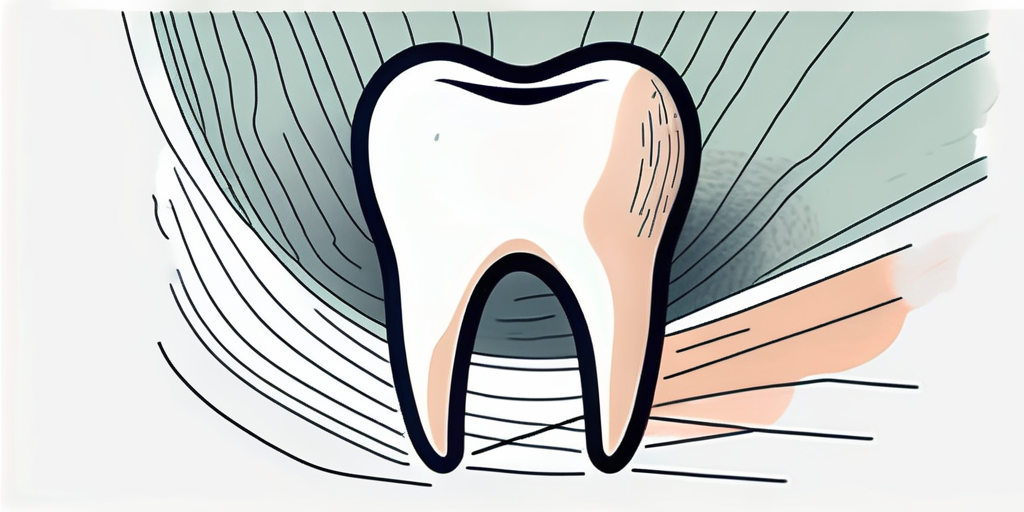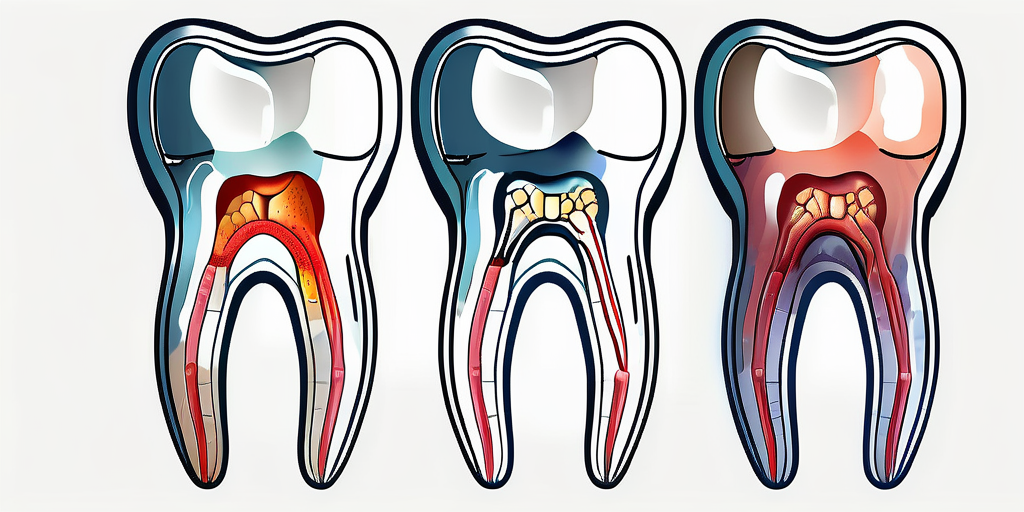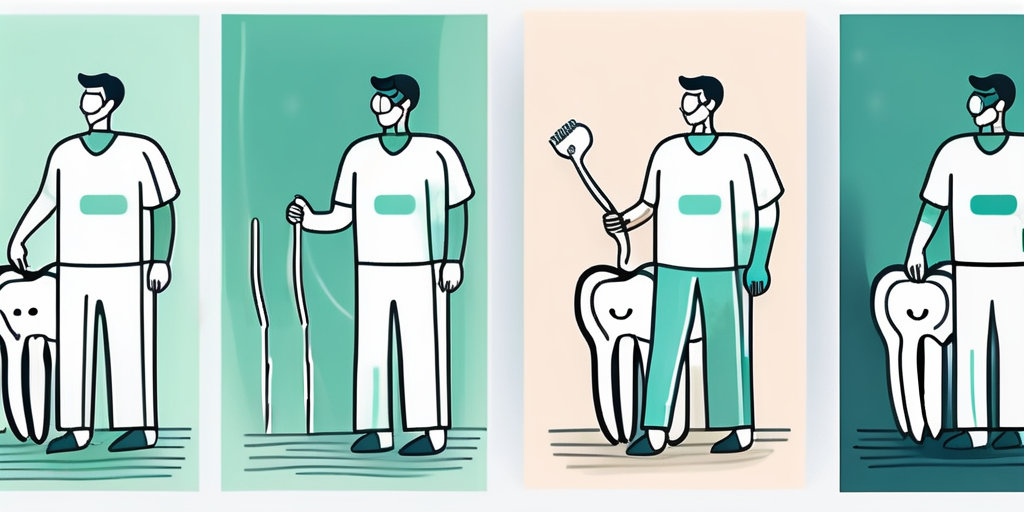
A tooth infection can cause discomfort and pain, and it's important to recognise the signs and symptoms so that you can seek appropriate treatment. Understanding what it is and what causes it can help you identify the problem early on, preventing further complications. In this article, we will discuss the various signs and symptoms of a tooth infection, as well as the pain and discomfort associated with it, systemic symptoms to look out for, and when it is crucial to seek medical help.
Also known as a dental abscess, occurs when bacteria invade the soft tissue or pulp inside a tooth. This can result from tooth decay, tooth trauma, or poor dental hygiene. The infection can spread to the surrounding gums and bone if left untreated.
When a tooth becomes infected, it can cause severe pain, swelling, and even fever. In some cases, the infection can lead to complications such as an abscess, which is a pocket of pus that forms at the root of the tooth. It is crucial to seek treatment promptly to prevent further spread of the infection and potential damage to the surrounding teeth and bone.
They can be caused by untreated cavities, cracked teeth, or dental procedures that introduce bacteria into the tooth. Poor oral hygiene practices such as infrequent brushing and flossing can also contribute to the development of tooth infections.
In addition to the aforementioned causes, certain medical conditions such as diabetes and a weakened immune system can increase the risk of developing tooth infections. It is essential to maintain regular dental check-ups and practice good oral hygiene to prevent the occurrence of tooth infections and maintain overall oral health.
One of the most common signs of a tooth infection is persistent toothache, which can range from mild to severe. You may also notice heightened sensitivity to hot and cold temperatures, as well as swollen and tender gums around the affected tooth. In some cases, you may experience a bad taste or foul odor in your mouth due to the presence of pus.

It is essential to pay attention to any changes in your oral health, as untreated tooth infections can lead to more severe complications such as abscesses or systemic infections. If you notice any of these symptoms, it is advisable to seek prompt dental care to prevent the infection from spreading further.
Aside from oral symptoms, a tooth infection can cause other physical symptoms. Swollen lymph nodes in the neck and jaw area, difficulty opening your mouth fully, and localized facial or jaw pain may indicate a tooth infection.
In some cases, a tooth infection can also lead to referred pain, where the discomfort is felt in other parts of the head and neck region. This can manifest as earaches, headaches, or pain in the temporomandibular joint (TMJ). It is important to consult a dentist if you experience any of these symptoms, as they may require specific treatment to address the underlying infection and alleviate the associated discomfort.
A tooth infection can cause different types of pain. You may experience a throbbing or constant ache in the affected tooth, which can worsen when you bite or chew. Pain may also radiate to your jaw, ear, or head, making it difficult to pinpoint the exact source.

Furthermore, tooth infections can lead to sensitivity to hot or cold temperatures, causing sharp, shooting pain when consuming certain foods or drinks. This sensitivity can be a sign of nerve involvement and should be addressed promptly by a dental professional to prevent further complications.
The intensity of pain associated with a tooth infection can vary. In some cases, the pain may be mild and intermittent, while in others, it can be excruciating and constant. Pain that wakes you up at night or prevents you from carrying out daily activities should not be ignored.
It is important to note that untreated tooth infections can progress and lead to more severe symptoms, such as facial swelling, fever, and the formation of a dental abscess. These advanced stages of infection can result in significant pain and pose risks to your overall health if left untreated. Seeking prompt dental care is crucial to prevent the spread of infection and alleviate discomfort.
In more severe cases, a tooth infection can lead to systemic symptoms. You may develop a fever, experience chills, and have swollen glands. These flu-like symptoms indicate that the infection has spread beyond the affected tooth.
When they progress to the point of causing systemic symptoms like fever and chills, it is crucial to seek immediate dental attention. The spread of infection to other parts of the body can have serious consequences if left untreated, potentially leading to complications such as sepsis.
General feelings of fatigue, malaise, and a decrease in energy levels can be associated with a tooth infection. This is a result of your body's immune response to the infection, as it tries to fight off the bacteria.
It is important to note that the fatigue experienced during a tooth infection is not just a normal tiredness but a symptom of the body's effort to combat the infection. The immune system goes into overdrive to fight off the invading bacteria, which can leave you feeling drained and unwell.
If you experience severe symptoms such as difficulty breathing, swallowing, or opening your mouth, it is crucial to seek immediate medical help. These signs may indicate a serious infection that requires urgent intervention.

Even if your symptoms are mild or moderate, it is important not to ignore them. Seeking early intervention for a tooth infection can help prevent the spread of infection to other parts of your body and reduce the risk of complications. Contact your dentist as soon as possible to schedule an examination and appropriate treatment.
By recognizing the signs and symptoms of a tooth infection, you can take the necessary steps to address the issue promptly. Regular dental check-ups and practising good oral hygiene can help prevent tooth infections in the first place. Remember, early intervention is key to maintaining optimal dental health and overall well-being.
Furthermore, it is essential to understand that tooth infections can sometimes lead to more severe complications if left untreated. In some cases, the infection can spread to the surrounding tissues, causing swelling and pain that can be debilitating. This can also result in the formation of an abscess, which is a collection of pus that can cause further damage to the tooth and surrounding structures.
Moreover, delaying treatment for a tooth infection can also increase the risk of systemic complications. Bacteria from the infected tooth can enter the bloodstream and potentially affect other organs in the body, leading to conditions such as endocarditis or brain abscess. Therefore, it is crucial to seek medical help at the first sign of a tooth infection to prevent these serious consequences.
If you're experiencing any of the signs and symptoms of a tooth infection, don't wait for the condition to worsen. Yes Dental is here to provide you with the personalized and expert care you need. Led by the experienced Dr. Puja Gumber, our family and cosmetic dental practice in Rouse Hill is dedicated to ensuring your dental health is in top shape. Book your appointment today and take the first step towards a healthier smile.








